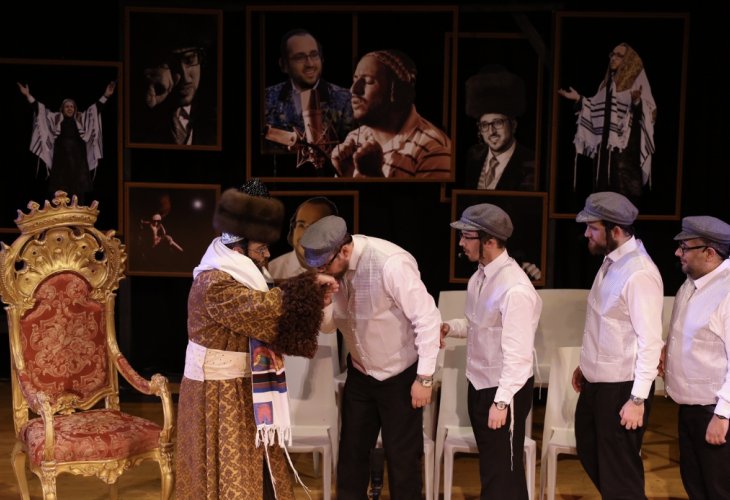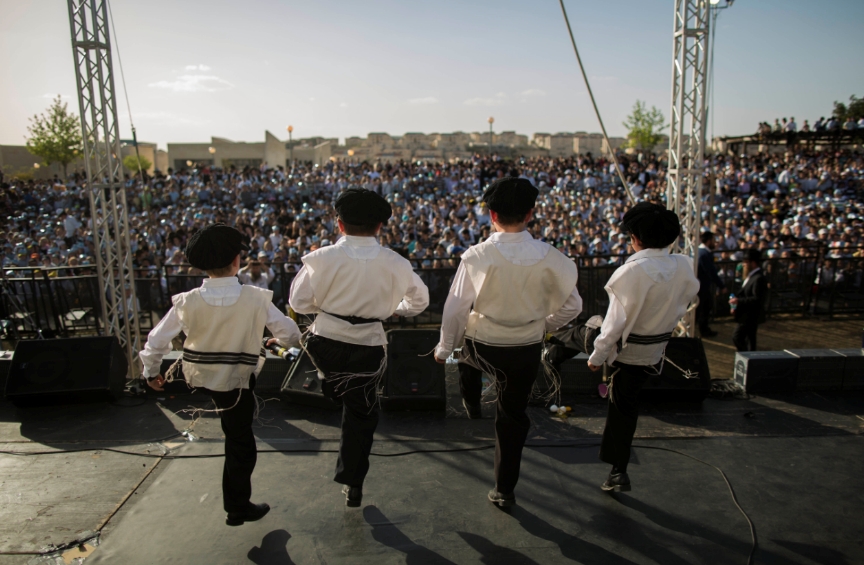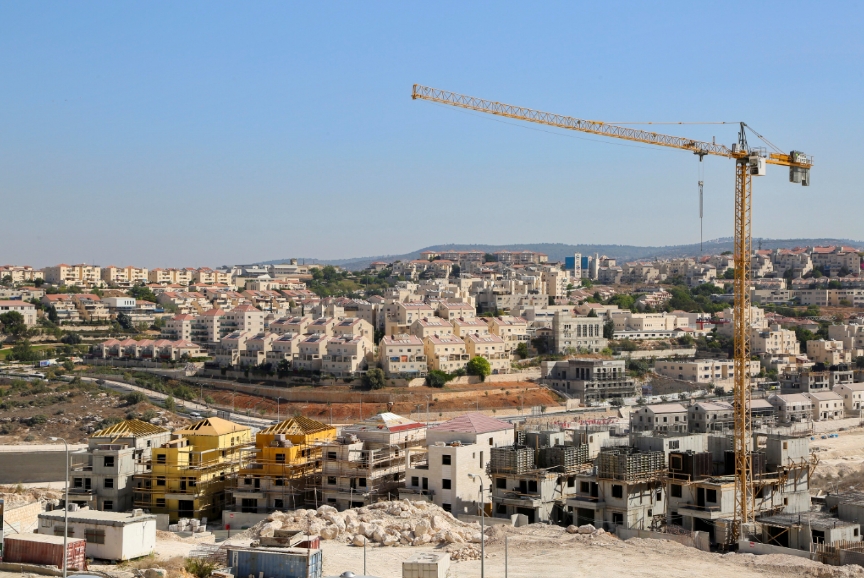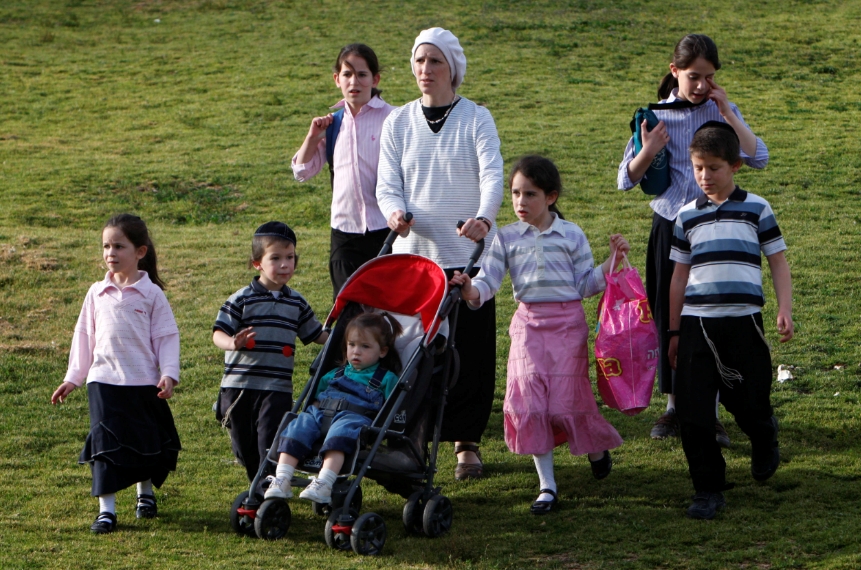Yehudit Lubrabom: "Today, Any Municipality Can Receive Dedicated Budgets for Haredi Culture"
With one hundred Haredi community centers across the country and organizations like the Ministry of Culture and Mifal HaPais starting to fund observant artists, Yehudit Lubrabom, director of the 'Culture as Law' forum, describes the unprecedented flourishing of Haredi culture.
 (Illustrative Photo: Flash 90)
(Illustrative Photo: Flash 90)Once, the word 'community center' was considered irrelevant in the Haredi community. Community centers existed, but they did not provide services suitable for the Haredi public.
Yehudit Lubrabom, director of the Gvanim Community Center in Beit Shemesh, which has a Haredi branch — the only Haredi branch in the city — is one of the people who were part of this change. Five years ago, she founded the 'Culture as Law' forum, which brought together managers of community centers, community centers, and departments of Haredi culture and society, as well as artists and producers from the Haredi community. A year ago, the forum became a registered association: the Haredi Union for Culture and Art.
"When we started, there were about fifty Haredi community centers," she says. "Today, there are already one hundred."
Why did it take so long for Haredi community centers to start rising? Lubrabom explains that the concepts of informal education and culture were new to the Haredi public. Over time, however, a new generation of artists and creators emerged (many of them returnees to religion, she notes). Simultaneously, the Haredi public began to realize that community centers and community centers provide important services to the community and enable a higher quality of life. "Today, there is almost no significant Haredi community without a community center or special culture department."
 (Illustrative Photo: Flash 90)
(Illustrative Photo: Flash 90)Ironically, in Bnei Brak, the largest Haredi city, there are no community centers or community centers, although there is an active culture department. "There is a difference between what unique culture departments and community centers do," explains Lubrabom. "It's wonderful that the Bnei Brak municipality brings many performances during Chol HaMoed, but what about the routine? A municipality can hold big events like a Challah separation evening or performance, but it cannot get into the details and create continuous, ongoing engagement with people. In Bnei Brak, there are big events during vacations — but, for example, there is no subsidized class during the week."
Why really?
"In Bnei Brak, it’s a function of space. There simply isn’t any land."
If the situation in the largest Haredi city is bleak, good news comes from cities not identified at all as Haredi. "The library of the Haredi community center in Holon is simply enviable," says Lubrabom. "And in Tel Aviv, Rishon Lezion, Petah Tikva — the community centers and centers for Torah culture enjoy budgets and benefits that allow them to offer many things that I, in Beit Shemesh, can't offer."
Beit Shemesh has made a big leap in recent years. The community center offers various subsidized classes (the 'Scientific Gardening' class, for example, is subsidized by the Ministry of Science and allows children to learn botany while gardening. The electronics class allows children to learn physics and chemistry and assemble various electronic kits, and so on), performances and artistic programs for adults and children, parent guidance and lectures on topics important to parents, and so on. Still, out of four community centers in the city, there is only one Haredi branch, active two days a week.
 Beit Shemesh (Photo: Flash 90)
Beit Shemesh (Photo: Flash 90)Why isn’t there a special Haredi community center?
"Because the non-Haredi public opposes any change in community centers. In Ramah Gimmel, we're making great efforts to open a Haredi community center, and indeed land and funding already exist — but from our experience, it will take another 5-6 years until this center is up and running."
What should you do if you live in a mixed or Haredi city and are not satisfied with the level of cultural services? According to Lubrabom, there is definitely something to be done. Firstly, she suggests checking what budgets the municipality receives from the state — and whether it uses them in the right place. "There’s a big city in Israel, not religious, that received 300,000 shekels from the state for children's books in the Haredi sector. Instead of giving it to libraries that desperately need a budget, the money went to publishing books for a yeshiva...so yes, there are places that really have no budget or the municipality is openly hostile and therefore it's hard to progress. But in other places — residents need to demand that Haredi representatives ensure the budgets reach the right place."
And today, it turns out, there are more budgets for Haredi culture than ever before. "Aryeh Deri very strongly introduced the concept of differential budgeting in the Ministry of the Periphery. Instead of having general culture money that only part of the public enjoys, the money should be earmarked — some for Haredi culture, some for Arab culture, and so on. All culture budgets going to support the periphery are distributed this way. Following him, Miri Regev's Ministry of Culture also built new support tests with affirmative action for minorities, including Haredim."
This approach has even entered Mifal HaPais, one of the main financers of culture in Israel. "A project like 'Pais Stages' that brings music performances to cities. Today, a mayor with a Haredi population cannot do what he wants with the money. He must prove he took care of a performance for the Haredi public as well."
 (Illustrative Photo: Flash 90)
(Illustrative Photo: Flash 90)One of the activities of the association headed by Lubrabom is working with Mifal HaPais so that criteria are flexible and allow for support for Haredi creators and artists. "Not long ago, they published a tender that one of the requirements was 'an entity that received funding from the Ministry of Culture in the last two years.' So we met and explained that it’s not realistic; it's very difficult for Haredi art to get support from the Ministry of Culture, and the criterion was removed. And another time, there was a requirement to upload a video of the performance to get support, which is problematic for women's performances — and again we talked, and the criterion was adapted."
In general, she says, the association often helps artists submit their support requests. "Most of them don’t know how to speak the right language to get the support."
With all due respect to the increase in the Haredi culture budget — is the level of culture rising accordingly? Lubrabom says there has been a significant professional development, but there’s still room to aspire. "Of course, it’s lessened, but there are still people who present embarrassing things on stage. The Haredi cinema is not where we would like, and we are still waiting to see quality films. Theater is developing, and there are amazing things, but still not everyone understands that theater isn’t a combination of presentation and dance. Comedy is very successful, as is quality music. Among children, they love plays with actors, animal shows, and jugglers. Movies go more with the girls."
But not only do the artists need to improve, she adds, but also the audience. "There are professional actresses, returnees to religion, who are shocked when women sit in front of them at a performance with a bag of snacks, chatting and laughing. The audience also has something to learn..."
Culture, of course, is not the only area of focus for community centers in Israel. In recent years, for example, many of them have entered the education field: operating nurseries and family care centers and even school summer camps.
"Around the world today, there's an understanding that local authorities need to be strengthened because they know their residents the best," says Lubrabom. "When managing family care centers is transferred from an association to community centers, for example — then any profit returns to the community in the form of additional community center activities. It’s a clear profit for the community. Or in Elad — it was decided that community centers would operate the schools of the summer vacation. Again, the community only gains."
And there is also the important educational role in the adult world that community centers fulfill. "For people, especially in the Haredi community, the community center can be the means that exposes them to information that would not otherwise reach them," says Lubrabom. "Whether it be lectures for parents on child safety, where we can speak in the clearest way, diet and health programs, parent guidance otherwise unaffordable for parents, and so on. We will soon start a project to raise awareness of women's cancer, which is life-saving. It’s important to understand that a community center is not just entertainment — it enters many places where there is a gap that needs closing."

